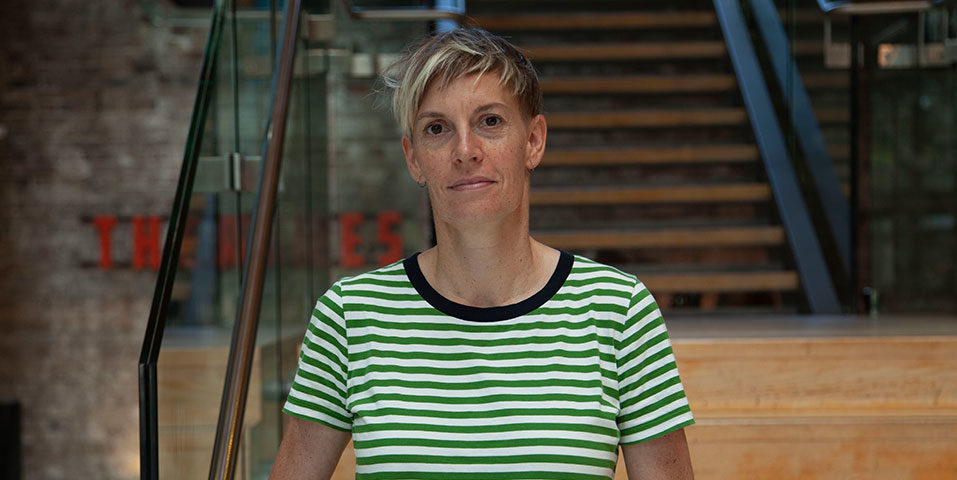Demand for screen content is at an all-time high. Getting that content from the camera to our screens takes a dedicated team of editors. The larger the volume of content, the greater the need for skilled and creative editors to shape the stories we see.
No one understands this more than editor and colourist Rebecca Edwards, whose local and international credits span a range of genres including reality TV, children’s TV, and documentary. Rebecca has made shows about everything from cooking and losing weight to serial killers and drunken monkeys. When she’s not locked up in an edit suite, Rebecca is dedicated to sharing her expertise with aspiring screen editors through the Assistant Editor (Unscripted) Intensive course at AFTRS, from which she herself graduated in 2007 with a Graduate Diploma in Film, Television and Digital Media Television Editing.
As she prepares for the next cohort of students, Rebecca offered some insights into her career as an editor and colourist.
AFTRS: The roles in film and television are many and varied. How did you find yourself in post-production?
REBECCA EDWARDS: I was born and raised in the UK, where I completed an undergraduate degree in drama and trained to be a teacher, and soon landed the role of Head of Drama in a high school. In 2004, I emigrated to Australia and decided to go back to uni to do a postgraduate degree in film, thinking I would diversify my teaching skills to include media studies. Along the road however, I fell in love with editing. I was entranced by its ability to guide the audience, hook into the audience’s emotions, and carefully control the ways in which stories could be told. I immediately applied to do another postgraduate degree at AFTRS, specialising in television editing. Back then AFTRS only accepted a handful of students into their courses, so I was very fortunate to be one of them. My first job after I graduated was as an assistant editor on Big Brother.
AFTRS: What’s your favourite career moment or achievement, so far?
RE: When I made the leap from assistant editor to colourist nine years ago, I bought myself a new (but very ordinary) car to celebrate. It signified a huge career turning point for me. I’ve been very lucky that my job has taken me to some amazing locations, and I’ve worked in various cities and remote locations around Australia as well as in London, Majorca and Costa Rica.
AFTRS: How does it feel to return to AFTRS as a teacher, after being a student here yourself?
RE: I love teaching. Teaching is a way to give back. A key part of that is putting myself in the shoes of someone who is as hungry as I was to get started in the industry. The TV and film industry can seem like a closed off world to people who aren’t in it, so teaching offers me a chance to share all my tips, tricks, and secrets to enable students to understand what they can do to break in and find enjoyable work.
AFTRS: What kinds of students does the Assistant Editor (Unscripted) Intensive course attract?
RE: Most of the students have had no TV or editing experience prior to commencing the course. There are no prerequisites. It’s always a thrill for me when I get an email from a student who has completed the course telling me they’ve found their first job in the industry. And, I’m pleased to say, I get a lot of these emails! My favourite to date is one student being offered work on The Voice within two weeks of completing the course.
AFTRS: You are also an Avid Certified Instructor. Why have you favoured Avid, and what would you say to those intimidated by the software?
RE: Avid is the most widely used software for editors and assistant editors working in long form film and television in Australia, and in many other countries too. Other types of software certainly have their merits, so it’s not about one piece of software being better. In long form format, it’s about which software can best serve the specific requirements of large-scale post-production. There is a huge amount of media to manage, and there may be 70 or more members of staff working on Avid, each of them completing specific tasks that can be passed back and forth efficiently and seamlessly between the team. Avid offers very attractive solutions to meet these needs. Of course, picking up a new piece of software can feel awkward and intimidating at the start – it’s horrible, I get it! Fortunately, in this Assistant Editor (Unscripted) Intensive course there is time to work at everyone’s pace, and with class sizes kept small, I’m able to spend time helping everyone individually.
AFTRS: Finally, what advice would you give to someone looking to enter the industry?
RE: Keep learning new skills that relate to your goals, keep developing your networks, keep developing those skills that make you a decent human being. Employers are looking for applicants for assistant editor roles who bring strong communication skills, who are trustworthy, proactive and enjoyable to spend time with, just as much as any experience they may bring. Days at work can be long and deadlines can feel stressful now and again. On those days, everyone benefits from being surrounded by a team of people who are focused and calm and kind.
Learn more about the Assistant Editor (Unscripted) Intensive and all our Avid courses.
